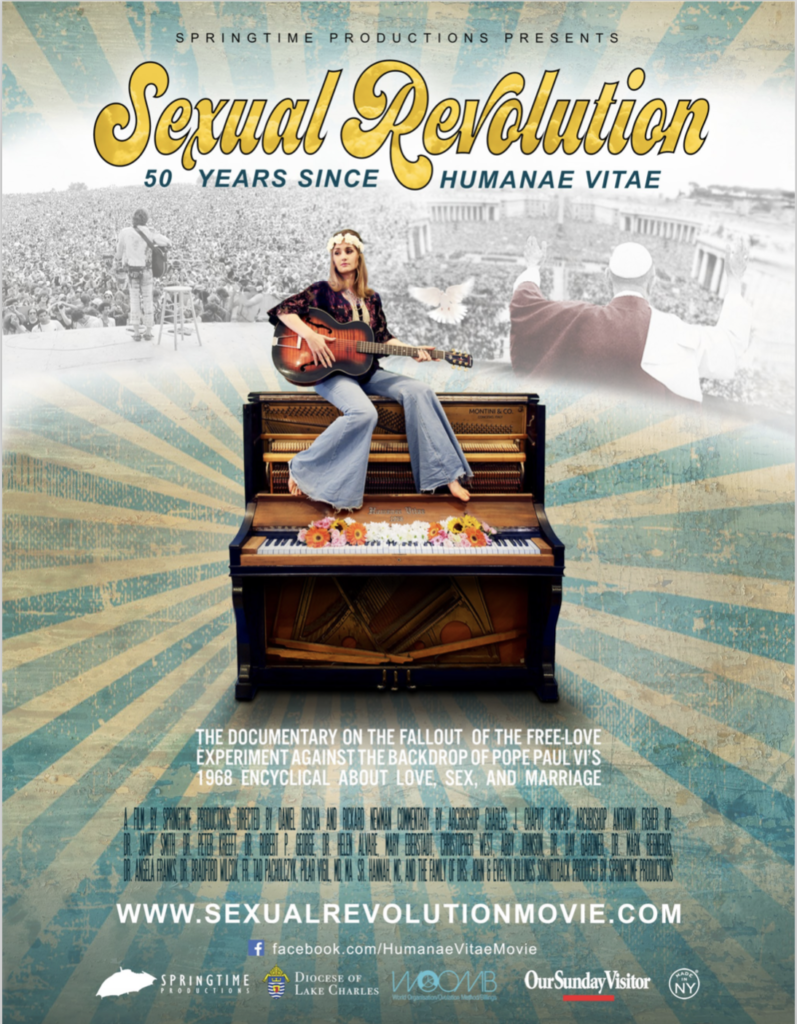The Sexual Revolution: 50 Years after Humanae Vitae Movie Review
by MUR Intern
Sexual Revolution: 50 years after Humanae Vitae Review
“Sexual Revolution: 50 years after Humanae Vitae” documents the fallout of the free love movement. Centered around one woman’s journey and supported by interviews and research, the documentary examines the problems posed by contraceptives and artificial reproduction methods. Among commentary from modern day Catholic thinkers, footage from the 60’s and 70’s sheds light on the real people who were working to counter society’s dominant “free love” direction after the sexual revolution. The documentary is narrated by a young donor-conceived woman, Alana Newman.
Alana wanted to know the truth about herself and where she came from. The only information that she had about her biological father (and that, after some digging) was that he was Polish and that he was Catholic. Alana’s search for answers about her own identity and that of her father led her somewhere she never expected: the Catholic Church. The discovery of her father’s heritage drew her into the Church as she became increasingly devoted to the teachings of St. John Paul II, another Polish Catholic. In the film, Alana takes viewers around in her orange Volkswagen bus as she looks at the way in which the Sexual Revolution of the 1960’s resulted in negative outcomes, despite all its promises. Contrary to its name, the “free love” movement didn’t result in more love or freedom.
In the midst of Alana’s personal story, the film features firsthand accounts and footage of doctors John and Evelyn Billings, two of the first people to study and teach about natural methods of fertility awareness. Their research, in conjunction with Pope Paul VI’s Humanae Vitae, offered some concrete solutions to the new mentality that arose from the Sexual Revolution—the idea that sex and children should be separate. In contrast to this history of Natural Family Planning (NFP) methods, the film traces the disturbing origins of oral contraception developed at the time. The Pill’s dark road to FDA approval and widespread use was paved with bribery and unorthodox methods of testing, including trials preformed on non-consenting patients of an insane asylum during the 1950’s.
Rooted in the works of St. John Paul II and Bl. Pope Paul VI, Alana highlights what the Church teaches about marriage and family with commentary from prominent Catholic thinkers and authors, including Archbishop Chaput of Philadelphia (current Chairman of the USCCB’s Committee on Laity, Marriage, Family Life, and Youth). Using a mix of interviews and archival footage, “Sexual Revolution, 50 years after Humanae Vitae” looks at the consequences that have arisen from today’s world of “consequence-free sex” and love inhibited by artificial means. The documentary highlights the Church’s teachings on marriage and the transmission of life, just as important as ever, 50 years after the promulgation of Humanae Vitae.
I enjoyed the film’s refreshing approach to the crisis of sexual morality facing our society. The impressive cinematography and musical score, including songs by Alana herself, make the topic accessible to a wide range of audiences. “Sexual Revolution: 50 years after Humanae Vitae” is a beautifully executed documentary with a clear message and definitely worth the watch.
